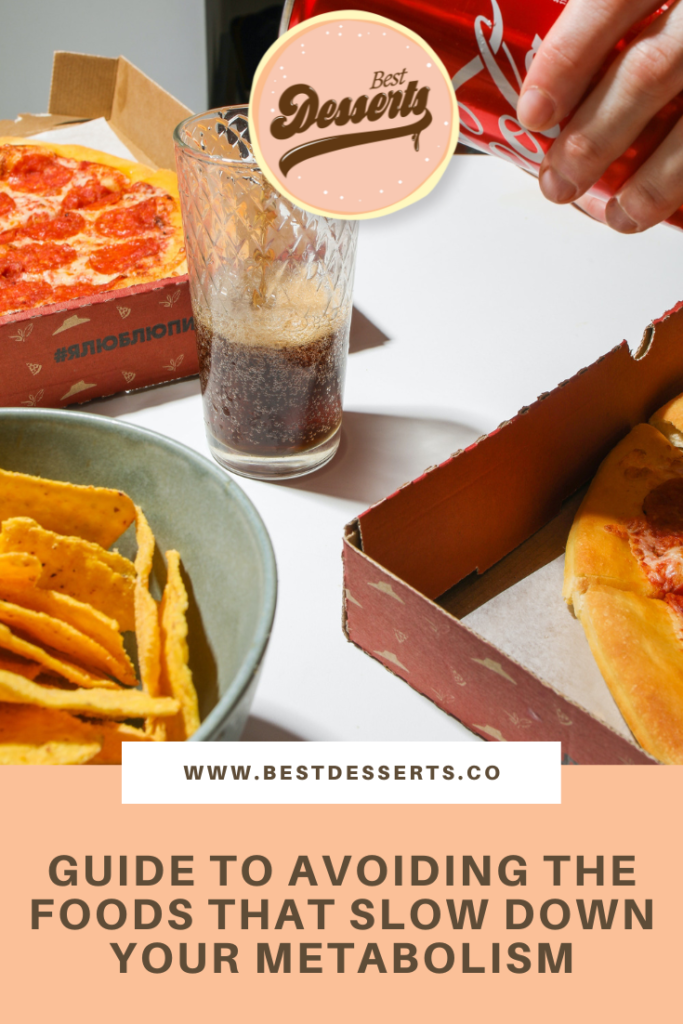Table of Contents
Metabolism refers to the chemical processes that occur within the body to maintain life, including everything from digestion and absorption of food to eliminating waste products.
A faster metabolism can lead to weight loss, increased energy levels, and improved overall health. Additionally, as we age, our metabolism naturally slows down, making it more challenging to maintain a healthy weight.
This article explores the foods that slow down your metabolism so you can avoid them.
Foods that slow down your metabolism
Processed foods
Processed foods are often high in sugar, salt, and unhealthy fats, which can slow metabolism. Additionally, they are often low in nutrients, making it harder for the body to function correctly.
Examples: Packaged snacks, frozen meals, and sugary drinks are all processed foods you should avoid to boost your metabolism.
Refined carbohydrates
Refined carbohydrates, such as white bread, pasta, and sugary cereals, are quickly broken down into sugar by the body, causing a spike in blood sugar and insulin levels. This can lead to weight gain and a slowdown in metabolism.
Examples: White bread, pasta, and sugary cereals are all refined carbohydrates you should avoid to boost your metabolism.
Trans fats
Trans fats, found in fried foods, margarine, and processed snacks, have been shown to increase inflammation in the body, which can slow down metabolism. Additionally, they can increase harmful cholesterol levels and increase the risk of heart disease.
Examples: Fried foods, margarine, and processed snacks are all foods that contain trans fats you should avoid to boost your metabolism.
High-calorie drinks
High-calorie drinks, such as soda, energy drinks, and sweetened coffee and tea, are often high in sugar and empty calories, leading to weight gain and slowing metabolism.
Examples: Soda, energy drinks, and sweetened coffee and tea are all high-calorie drinks you should avoid to boost your metabolism.
Incorporating foods that boost your metabolism into your diet
Plan your meals and ensure you have the ingredients to make healthy, metabolism-boosting meals.
Be mindful of portion sizes when incorporating these metabolism-boosting foods into your diet.
Consult a registered dietitian or nutritionist for personalized advice, recipes, and meal ideas that can help you boost your metabolism.
Conclusion
Processed foods, refined carbohydrates, trans fats and high-calorie drinks are all foods you should avoid to boost your metabolism.
It’s important to remember that even healthy foods can be high in calories if consumed in large quantities, so a balanced diet is vital.
Consulting a registered dietitian or a nutritionist can help provide personalized advice and support for finding the best eating pattern that works for you.
In conclusion, the foods you should avoid to boost your metabolism include processed foods, refined carbohydrates, trans fats, and high-calorie drinks. These foods can slow metabolism, increase inflammation, and lead to weight gain. However, it is essential to remember that a balanced diet is vital, and even healthy foods can be high in calories if consumed in large quantities.
To boost your metabolism, it is essential to plan your meals, be mindful of portion sizes, and seek personalized advice and support from a registered dietitian or a nutritionist. With the right approach, it is possible to boost your metabolism and achieve your weight loss goals.
Frequently Asked Questions
Q: What are the foods you should avoid to boost your metabolism?
A: Processed foods, refined carbohydrates, trans fats, and high-calorie drinks are all foods you should avoid to boost your metabolism.
Q: How do processed foods slow down metabolism?
A: Processed foods are often high in sugar, salt, and unhealthy fats, which can slow metabolism. Additionally, they are often low in nutrients, making it harder for the body to function correctly.
Q: Can refined carbohydrates slow down metabolism?
A: Yes, refined carbohydrates can slow down metabolism as they are quickly broken down into sugar by the body, causing a spike in blood sugar and insulin levels, leading to weight gain and a slowdown in metabolism.
Q: How do trans fats slow down metabolism?
A: Trans fats increase inflammation in the body, which can slow down metabolism. Additionally, they can increase harmful cholesterol levels and heart disease risk.
Q: Why are high-calorie drinks not recommended to boost metabolism?
A: High-calorie drinks are often high in sugar and empty calories, which can lead to weight gain and slow down metabolism.
Q: What should be done instead of eating these foods?
A: Consult a registered dietitian or nutritionist for personalized advice, recipes, and meal ideas that can help boost your metabolism.


